Suppose that myData is a list of sublists. Each sublist has a length of one or greater and contains any number of replicates of the integers 1, 2, 3, and 4. I would like to create a function myFun that counts the number of each integer in the sublist.
As an example, suppose that I have the following myData:
myData = {{2, 3, 3, 1, 1, 3, 2, 2, 4, 1, 1, 1, 2, 2, 2, 2, 2, 1, 1, 1}, {2, 2, 3, 1, 1, 3, 2, 2, 3, 1, 1, 1, 2, 2, 1, 2, 2, 1, 1, 1}, {1, 2, 2, 1, 1, 3, 2, 1, 3, 1, 1, 2, 2, 2, 2, 3, 1, 1}, {2, 3, 3, 1, 1, 2, 3, 2, 3, 1, 2, 1, 2, 1, 2, 2, 2, 1, 1, 1}}; I would like myFun /@ myData to return the output:
{{{1, 8}, {2, 8}, {3, 3}, {4, 1}}, {{1, 9}, {2, 8}, {3, 3}, {4, 0}}, {{1, 8}, {2, 7}, {3, 3}, {4, 0}}, {{1, 8}, {2, 8}, {3, 4}, {4, 0}}}
In other words, sublist 1 has eight 1s, eight 2s, three 3s, and one 4, and similarly for the other three sublists. The key feature here is that all of 1, 2, 3, and 4 are listed, even if one or more of them have zero population.
Using the following (taking advantage of Tally) gets me close:
myFun[sublist_] := SortBy[Tally[sublist], First] myFun /@ myData {{{1, 8}, {2, 8}, {3, 3}, {4, 1}}, {{1, 9}, {2, 8}, {3, 3}}, {{1, 8}, {2, 7}, {3, 3}}, {{1, 8}, {2, 8}, {3, 4}}}
But Tally does not list members with zero population, so the above does not satisfy the key feature.
On the other hand, the following (using Count) seems to accomplish my goal:
myFun[sublist_] := Map[{#, Count[sublist, #]} &, {1, 2, 3, 4}] myFun /@ myData {{{1, 8}, {2, 8}, {3, 3}, {4, 1}}, {{1, 9}, {2, 8}, {3, 3}, {4, 0}}, {{1, 8}, {2, 7}, {3, 3}, {4, 0}}, {{1, 8}, {2, 8}, {3, 4}, {4, 0}}}
But, is there a more succinct, more elegant way to do this? Thanks for your time!


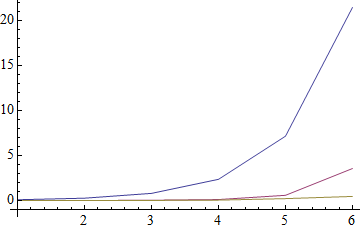
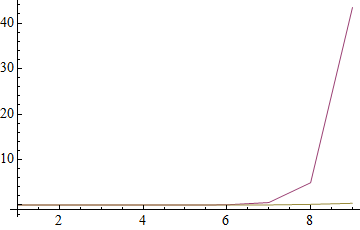
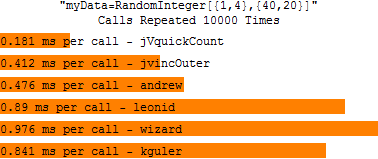
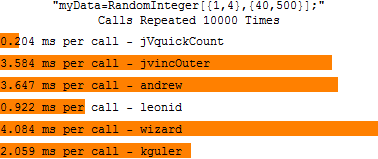
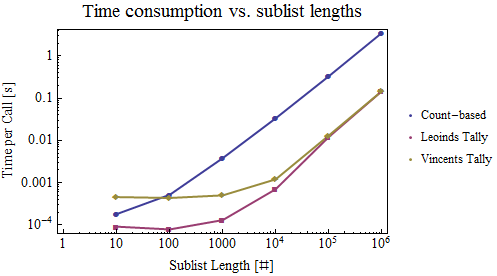
Outer[Count, myData, {1, 2, 3, 4}, 1]$\endgroup$